A COLLECTION OF FOOTBALL LEGENDS…FORTY YEARS LATER MUCHERAHOWA FINALLY BROKE THE CODE OF SILENCE
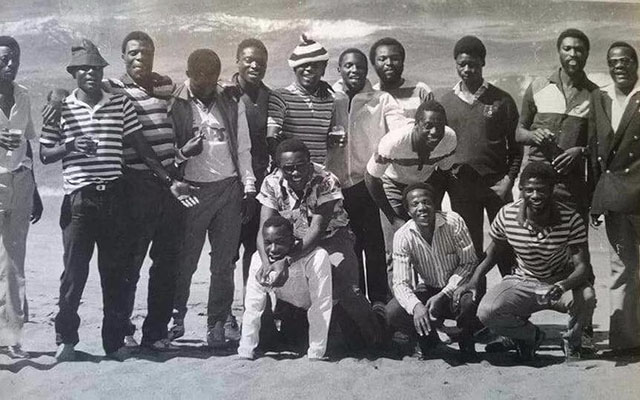
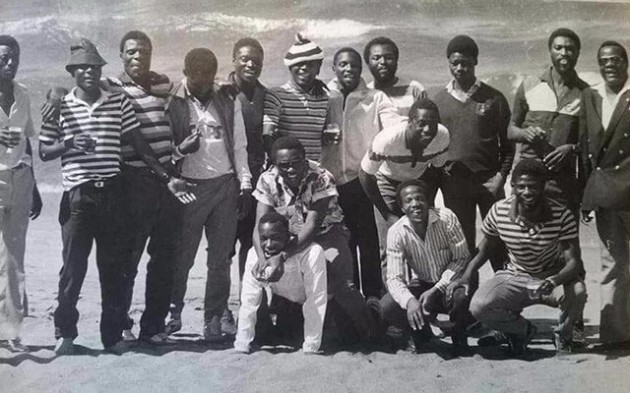
A GROUP OF SUPERMEN . . . David Mwanza (kneeling, extreme right), who rose from our small mining town in Chakari to become one of the finest football players to grace Zimbabwe’s stadiums, poses for a group picture with his Warriors teammates when he played for our national team
Sharuko on Saturday
WE didn’t know it back then, being mere toddlers who were totally reliant on the comfort of their mothers to survive the first year of our introduction into this world, after nine months of being shielded away from its brutality, in the bellies of these very special people.
But we know it now, which is the unrivalled beauty of life, that we were the special generation whose arrival on the scene coincided with the World Cup being broadcast in the splendour of colour on television for the first time in history.
The immortal Pele, in his final World Cup finals appearance, leading his star-studded Brazilians — widely acknowledged as the finest group of individuals to grace this global football festival — to a success story in Mexico City.
As this incredible football specimen waved goodbye to the grand stage of the World Cup, after winning a third title in four tournaments, his native Brazil welcomed the arrival of Cafu, a footballer who — with the passage of time — would become the country’s most capped player of all-time.
We arrived just as the world reluctantly said goodbye to the Swinging Sixties and everything that defining decade represented — a global cultural revolution, the Beatles, the civil rights movement in the United States, the Vietnam War and the romance of seeing man land on the moon.
Millions of those who lived through the Swinging Sixties have struggled to deal with adjusting to the end of a decade which defined their lives, in more ways than one, and left memories to last a lifetime.
Canadian rocker Bryan Adams probably best captures that nostalgia, which is still strong 50 years later, on behalf of those millions who have found it difficult to let go of the good times they enjoyed in the Swinging Sixties in his classic song, Summer of 69.
“I got my first real six-string
Bought it at the five-and-dime
Played it ‘til my fingers bled
Was the summer of ‘69
Me and some guys from school
Had a band and we tried real hard
Jimmy quit, Jody got married
I should’ve known we’d never get far
Oh, when I look back now
That summer seemed to last forever
And if I had the choice
Yeah, I’d always wanna be there
Those were the best days of my life
And now the times are changin’
Look at everything that’s come and gone
Sometimes when I play that old six-string
I think about you, wonder what went wrong
Standin’ on your mama’s porch
You told me that it’d last forever
Oh, and when you held my hand
I knew that it was now or never
Those were the best days of my life.’’
It was back in those Swinging Sixties when the late Sam Dauya, and his colleagues, came together to form a football club which would be a project steeped in the rebellion against the politics of the time and the yearning by the black community in Harare for something special they could call their own.
As fate would have it, Dauya passed away just a day after his Glamour Boys sent shockwaves across the continent by handing the then defending African champions Etoile du Sahel of Tunisia a rare defeat in their backyard in continental inter-club matches in Sousse — to knock them out of the 2008 Champions League.
Benjamin Marere scored that priceless goal in Tunisia, to complete back-to-back victories for DeMbare, who had also won the first leg 1-0 in Harare and in that outpouring of celebrations in the capital, a fitting soundtrack was provided for Dauya to finally take his eternal rest in peace.
A JOURNEY BACK INTO THE PAST 40 YEARS AGO
Thirty one years earlier, in 1977, our Generation of ’70, had turned seven, been accepted into Grade One, back in the days when you needed to be at least seven years old to be accepted as old enough to undergo the first phase of primary school tutelage.
We didn’t know it back then, trapped in the excitement of finally getting a chance to wear those khakhi uniforms, making new friends and mastering the alphabet, that something big was about to be born in our football in our first year as Grade One pupils.
But we know it now, that we were also the special generation whose arrival on the school scene — to receive the blessings that come with education — coincided with the birth of the Harare Derby in 1977.
Of course, we had heard a lot about Dynamos, such has always been the massive influence of this football phenomenon it had already cast its shadow over our sleepy gold mining community we called home.
But for all its national appeal, which even spilled into our little community, Dynamos was something from a distant outpost, of course, very big for it to be known among us, but not powerful enough to dilute the attachment that we all felt for our hometown club.
The elders called it Bwela Ufe, a Nyanja phrase for Come and Die, and it could have originated either from our team’s remarkable success rate at home, where we usually won, or as a response to one of our biggest rivals from a nearby settlement called Martin Spur, nestled between Kadoma and Chegutu, whose team was called Come Again.
I was a Falcon Gold fan by birth, my late dad used to be the team’s goalkeeper and that football used to dominate conversations at home was as predictable as it was refreshing and, being the ‘keeper’s son, it meant I had a guaranteed seat on the team bus — which used to carry the players, coaches and fans — to our away matches.
There was always a sitting pattern, which was followed religiously — the first seat belonged to our head coach George Marabishi, and if his surname sounds bizarre, then you ain’t heard anything yet.
For this was a football team whose stars included players with names, not nicknames, like our ‘keeper Chakumanda (of the graves), Mutambarika, Aidan Sweet, Kamukanda, Bhibho, Aaron Fly, Tetete Nguo, Luke Zhatanga and Didymus Damiano.
Even the names of the Nyau dancers who used to entertain us before our matches — Gomanikwende, Dhinte, Kamwimwi, Chin’omben’ombe, Chimakanje, ChiMaria Chinagwa Bere (loosely translated as Maria with a drooping pair of breasts), Gaurani, Shero — didn’t appear weird ones back in those days.
And some of our team’s biggest fans included people like Don’t Talk Phiri, Sozibury Chirwa, Plan and Iwell Chirwa, Tirire and the sisters Cheinedi and Chewire.
Anyway, back to football.
Our players would then sit just behind their coaches and then, the rest of us, the fans, would occupy the back seats on the 76-seater bus for our trips to the away games which usually came every other Sunday.
I’m not exactly sure as to the exact year my old man started taking me along on that bus for the away matches, but I know that by the time I enrolled for my Grade One, in 1977, I had become a very regular traveller on those trips driven by the desire to always come back and boast to my classmates, on Monday mornings, of the sights and sounds of those away games.
I remember that because it’s something which put me into a lot of trouble, and a number of beatings, from my Grade One teacher, Ms Sinamane, on the numerous occasions she caught me relaying the events of those away matches to my classmates when we were supposed to be paying attention to what she was teaching us.
I guess, when I come to think of it now, all this story telling, trying as much as I could to put the events of what I had seen on the field of play in our away matches to my classmates, played a part in what I now do for a living today.
THE DERBY@40 IN A YEAR MEMORY LAID BARE ALL THE RITUALS
Tomorrow’s showdown at the National Sports Stadium marks the 40th anniversary of the Harare Derby, a contest between Dynamos and CAPS United which started in the very same year that some of us began our primary school adventure.
Time flies, and it just doesn’t feel real that 30 years have come and gone since our group, which was admitted for our Grade One studies back in 1977, completed our Form Four studies in 1987, finally making the leap from what they described as Ordinary to Advanced Level studies.
This year’s Derby, which has been delayed for months because of CAPS United’s Champions League commitments, comes in the year that former DeMbare skipper Memory Mucherahowa laid bare the bizarre world that was part of their life at the Glamour Boys in his autobiography “SOUL OF SEVEN MILLION DREAMS.’’
The man who captained DeMbare to three league titles and a place in the final of the CAF Champions League is widely regarded, for good measure, as an icon at the club.
His real name is Edwin Zindoga Mucherahowa.
“I was christened Edwin Zindoga Mucherahowa after my birth on June 19, 1968, in Harare,’’ he writes in his book. “How on earth I found myself stuck with the mysterious name ‘Memory’, which to me is feminine, I do not know. I loathed the bloody name.’’
Memory, or Edwin, whichever you prefer, laid bare all the rituals they used to do at DeMbare during his days in his book and it made a huge impact he was even invited as a guest on the BBC Focus On Africa programme to discuss the issue.
“Dynamos FC, just like most clubs throughout the world, was deeply entrenched in superstition. I was heavily involved in all this,’’ he writes in his book.
“The team believed more in juju than players’ ability. We believed in collective use of the juju and consulted one traditional healer as a team. In most cases we had the team’s traditional healers who were on the team’s pay roll.’’
There is a lot on that, in his book, including a juju man who came to cut their toes and administer some juju on the eve of DeMbare’s Champions Cup quarter-final showdown against Canon Yaounde of Cameroon in 1987, which they needed to win 1-0 and qualify for the semi-finals for the first time.
As it turned out, the match ended 1-1, and DeMbare were knocked out and Memory says the juju man blamed it all on Gift M’pariwa, whom he accused of having broken the code by making love to a woman two days before the big match when the players had been told not to do so for four days before that game.
Richard Chihoro, the DeMbare team manager, has been forced to defend himself, now and again, that he isn’t the team’s juju man or the link between the club and their juju man with conspiracy theorists saying he owes his place on the bench — where he never gets fired when the coaching staff goes — on his so-called superstitious powers.
Back in 1996, when CAPS United finally found a way to win a league title for the first time after Independence, we used to be told at Raylton Sports Club, that the man behind their mysterious powers was called Afante.
For me, given my background in Chakari, where it was common knowledge that our team also relied on our juju man, who would be employed by the mine specifically for the provision of his specialist services to the club, paid for whatever he was doing to make our Falcon Gold a very potent outfit, this didn’t come as a surprise.
By the ‘80s, when the management at our mine decided Falcon Gold, just like Rio Tinto, should try and fight for a place in the Premiership rather than be content with swinging between Division One and Two, we were told a decision was taken to hire the very best of the juju men.
He was a mysterious chap, without a wife or kids, lived a reclusive life and no one appeared to know his name, or bother to ask him, except his nickname, Yellowman, which came from his very light complexion.
I had long lost the innocence of my Grade One year, having grown into a teenager who could now question some things, when one Sunday morning, we were told Yellowman had directed that the team bus would carry a very limited number of fans, only four to be precise, for the trip to Harare.
Given that we were going to play State House Tornadoes, quite a powerful team back then, at Dzivaresekwa in a Cup game, all this defied logic as the expectation had been that the team would actually need its full contingent of fans for this tough test.
Then, amid our rebellion, the elders told us that Yellowman’s decision was the correct one because our team bus couldn’t afford the weight of the load of a full bus on a day when our juju man was also carrying our home ground on its carrier for our players to use away from home.
It might sound ridiculous, but that’s what happened and, lucky me, being the old retired ‘keeper’s son, I was one of the five fans picked for that trip to Harare and by half-time, our Falcon Gold were leading their opponents 1-0 and Yellowman, sitting inside that stadium, was calmness personified.
The Tornadoes players, though, included David Mwanza, our hometown hero who was now playing for these big boys, and on his way to the dressing rooms for the break, he saw Yellowman.
What we later heard was that he ordered Yellowman’s ejection from the ground and, in a flash, we could see the juju man being dragged outside the stadium with some people sprinkling all sorts of liquids, including urine, on him.
And, in the final 45 minutes, our team conceded five goals, scoring none, and on the trip back home, someone even joked that we had conceded a goal for every fan on the bus and one for Yellowman.
I have always belonged to that camp which doesn’t believe in this juju thing in football because, if it did, why is it that for all our deep-seated beliefs in it throughout the game across the continent, we have never won the World Cup?
The DRC took nine juju men to Germany for their only appearance in a World Cup finals in 1974 and, in one match against Yugoslavia, conceded nine goals — a goal for every witchdoctor who was with them.
That my beloved Falcon Gold never made it into the Premiership, despite all the investment into the juju men, has also convinced me all this juju madness in football really doesn’t work.
And, as the Harare Derby celebrates its 40th year tomorrow, here’s my toast to all the great players, coaches, fans and administrators who helped make this iconic fixture, whose appeal has stood the test of time.
Don’t ask me why I haven’t extended a toast to all the juju men who have been part of this iconic Derby, from its beginning to this day.
- To God Be The Glory
- Come on Warriors!!!!!!!!!!!!!!!!!!!!!!!!!!
- Khamaldinhoooooooooooooooooo!
- Text Feedback — 0772545199 (I’m back again on Econet)
- WhatsApp Messenger — 0772545199
- Email — [email protected]
- Skype — sharuko58
- Chat with me on Facebook, follow me on Twitter @Chakariboy, interact with me on Viber or read my material in The Southern Times or on www.sportszone.co.zw. The authoritative ZBC weekly television football magazine programme, Game Plan, is back on air and you can interact with me and the legendary Charles “CNN” Mabika and producer Tich “Chief” Mushangwe every Monday night NOW AT 21.15pm.




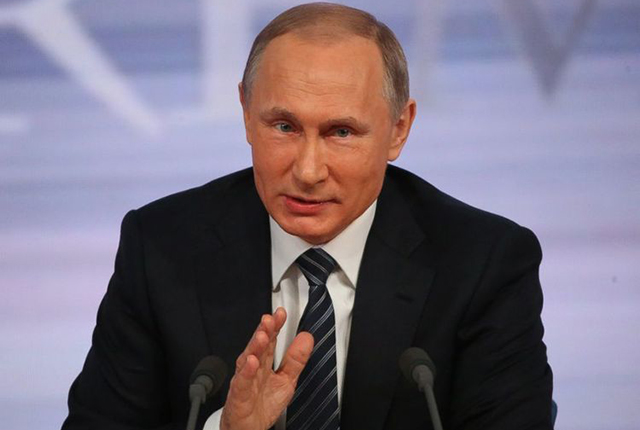
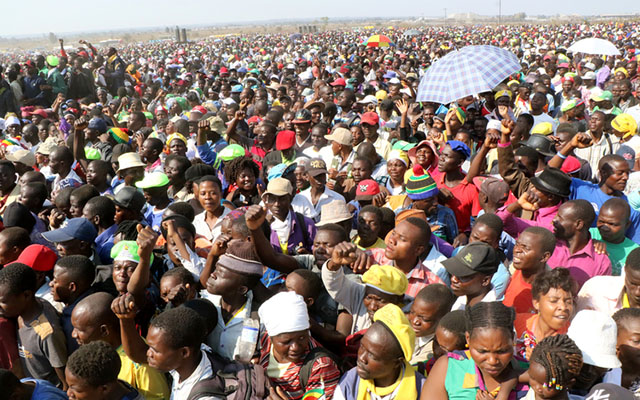

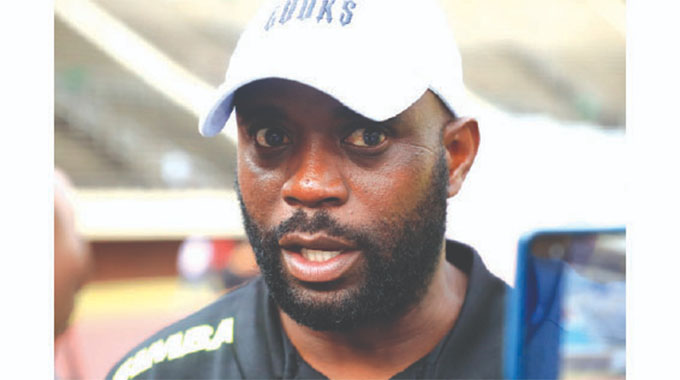


Comments